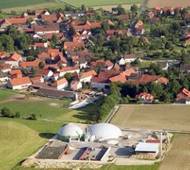
750 Germans cant be wrong A tiny village in Germany ends its dependence on the grid this month. Juhnde in central Germany has attracted the attention of renewable energy advocates because it makes all the electricity and heat for its residents from a combination of manure, silage and wood chips.The initial investment to take the village off the grid was E2.9 million for the biogas facility (pictured), E900,000 for the heating system and E1.6m for a hot water pipeline. Finance was a mix of grants and loans taken out by the village and repaid out of future savings on the energy bills that households are no longer paying. The community will also generate revenue by selling the surplus energy it generates back to E.On which was required by law to pay a fair price.
Morrisville State College, and a surrounding area in Central New York is preparing to follow the German example. here. Although the economic and political landscape is different here, Juhnde’s example holds promise for rural communities, everywhere.
“Upstate New York has many, many villages that are ideally suited for that kind of a situation,” said Ray Cross President of Morrisville State College.
Engineers from O’Brien & Gere, in DeWitt, have partnered with a German company to work on a project in Pennsylvania, said Darek Letkiewicz, vice president.
O’Brien & Gere and Lahmeyer International jointly won a bid to develop a wood-burning combined heat and power facility in Smethport, Pa. Terms of the contract are still being negotiated, Letkiewicz said.
